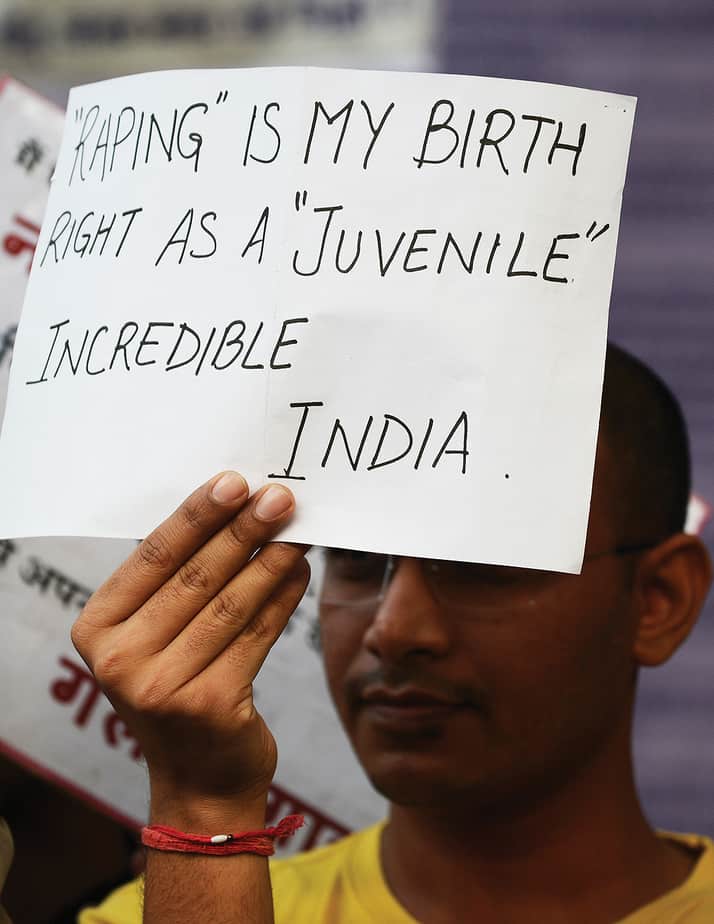With the sudden surge in teenagers being involved in heinous crimes, the juvenile justice system has yet again been brought into question: Is it logical to try minors as adults?
In June this year, a teenager along with the rest of his family, was accused of attacking a woman and killing her. He had allegedly abused and beaten her. But the court refused to find him guilty as he was a minor, and had acted under the influence of his adult family members.
Soon after that in July, another young teenage boy sexually assaulted and killed a five-year-old, by smashing his head with a brick. He is now holed up in a juvenile home.
A similar crime that had taken place in 2013, is seeing new developments in 2018. Five years ago, a five-year-old child was brutally raped by two men — Manoj Sah and Pradeep Kumar, who were 22 and 19 years old respectively. The child, who was named ‘Gudiya’ by the media, was abducted and kept in a room in Sah’s house (in the same building she lived in) without being given food or water. She was found bleeding from her anus and vagina, with remnants of wax and plastic from candles and bottles inside her.
The accused duo fled the scene, fearing that they had strangulated her to death. The child was found two days later by family members who heard her cries. The culprits were captured within a week of their flight.
Consequently, Kumar provided documents that stated that he was a minor. His claim was that he was 15 years old and thus should be tried as a juvenile. Following this claim, backed by documents, he was not detained. The case, however, did not end there.
Senior advocate HS Phoolka from Bachpan Bachao Andolan who had taken up the case, aided by Advocate Shashi Chaurasiya, says they all knew his claim for being tried as a juvenile was false. Fast forward to July 2018, when Justice Sanjeev Sachdeva declared that Pradeep Kumar was in fact not a minor — as proven by an ossification test — at the time he committed the crime. This has resulted in Kumar being taken into custody again. For a year in the interim, from June 2017 to July 2018, he walked a free man.

Given this recent finding, as well as the frequent cases of juvenile delinquency, a question has been raised as to whether these minors who commit heinous crimes, should be tried as adults, or whether they should be afforded special privileges due to their age. Amod Kanth, former DGP & Chairperson, Delhi Commission for Protection of Child Rights (DCPCR) and founder of Prayas Juvenile Aid Centre, strongly believes that the latter should be the case. “When you want to jump ship from the juvenile justice system to the criminal justice system, your position will always be precarious.”
He says that of all the cases of juvenile delinquency that actually take place, only a few are ever reported, and fewer still are entered as FIRs. “I strongly disagree with the idea of bringing children into the criminal justice system,” he asserts.
Considering the fact that children below the age of 18 are not allowed to drive or vote or make other adult decisions, Kanth is of the opinion that they should not be tried for heinous crimes the same as adults are either. He stands firmly against the amendment that allows for trial of minors guilty of heinous crimes as adults.
Kanth goes on to cite the different aids and provisions available for aftercare of juvenile delinquents — however, he also mentions that many of them are not being implemented. Adoption or foster care facilities are not widely available to these at-risk children, especially if they are in conflict with the law. He believes that the media or the majority’s perception should not hold the reins for changes in the law.
According to him, the age of 18 was agreed upon internationally, and that should be regarded as the letter of the law. “Maturity and mental stability have to be subjective, but the law cannot afford to be flexible in that respect.”
He argues that if a minor is not being allowed the advantages of the legal system in certain respects, they should to be tried on the basis of the same legal system without being part of it. Only about 0.07 per cent of the cases registered involve children accused of heinous crimes. That, according to him, is not enough of a margin to justify changes in law.
Contrarily, Chaurasiya believes that the slackening of the rigid 18-year-old rule has only worked for the better. She agrees that a child who is perhaps seven or even 12 will probably not be entirely aware of the consequences of a crime he or she commits. However, those who are — or claim to be — on the cusp of the age limit, should not be able to escape punishment. Considering the nature of the crime and the gravity of the situation, they should be dealt with accordingly.
“Children or teenagers are not like they used to be when these laws were put in place,” says Chaurasiya. “They are much more conscious and aware of their actions.” She believes that as the times change, we need to make provisions for the law to evolve as well.
Advocate Jeetender Gupta weighs in with a more balanced view on the subject, conceding the validity of both sides of the argument. “It is contradictory to the concepts agreed upon internationally, with regard to the age that signifies an adult, but at the same time, individual concerns cannot be held above societal concerns.”
With time, he says, mental depravity is increasing as well as the gravity of crimes. Given the evolving nature of the crimes and criminals, the law governing the same should also be subject to amendments. And according to him, the implementation of the new amendment, as per which individuals aged 16-18 accused of heinous crimes can be tried as adults, has only helped in apprehending or taking such criminals to task. The amendment to the Juvenile Justice (Care and Protection of Children) Act, 2000 came into force on January 15, 2016.
Opposing views on this issue is an understandable byproduct of reforms in the juvenile justice system, and remains a point of contention amongst people in the circuit. Ideally, the guilty should be punished and also given a chance to reform themselves.





